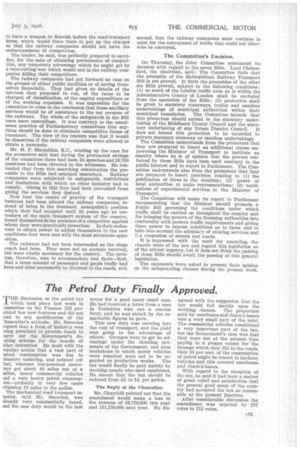The Petrol Duty Finally Approved.
Page 53

If you've noticed an error in this article please click here to report it so we can fix it.
THE discussion on the petrol tax 1 which took place last week in :ommittee on the Finance )3111 pre • sented few new features and did not 'cad to any modification of the L'hancellor's attitude. Mr. Snowden trgued that a form of industry was )eing penalized to provide ,funds to :.arry out the Government's demting schemefor the benefit of Alter industries. He dealt with the -iopular notion that a vast part of )etrol consumption was due to aleasure motoring, and pointed out hat, whereas low-powered motor!ars got about 40 miles out of a ;anon, heavy commercial vehicles tad a very heavy petrol consumpion—probably in very few cases ittaining 10 miles to the gallon.
The mechanical road transport inlustry, said Mr. Snowden, was dready verysubstantially taxed, Ind the new duty would be the last straw for a good many small men. He had received a letter from a man in Yorkshire who ran a one-ton lorry, and he was struck by the re markable figures he gave. • This new duty was entering into the cost of transport, and the yield was going to the advantage of others. Garages were to get no advantage under the derating proposals of the Government, and even workshops in which motor vehicles were repaired were not to be regarded as productive works. The tax would finally be paid mainly by working people who used omnibuses. He moved that the tax should be reduced from 4d. to id. per gallon.
The Reply of the Chancellor.
Mr. Churchill pointed out that the amendment would mean a loss to the revenue of 18,750,000 this year and £11,250,000 next year. He dis • agreed with the suggestion that the tax would fall mainly upon the working classes. • The proportion paid by omnibuses and chars-ii-bancs was a very small part of the total. The commercial vehicles constituted a very important part of the tax, but the Government's case was that they were not at the present time paying to a proper extent for the damage which they did to the roads. Only 10 per cent, of the consumption of petrol might be traced to hackney vehicles and this covered omnibuses and chars-k-banes.
' With regard to the reception of the tax, he said it had been a matter of great relief and satisfaction that the general good sense of the country had accepted the tax as reasonable at the present juncture.
After considerable discussion the amendment was rejected by -237 votes to 115 votes.












































































































